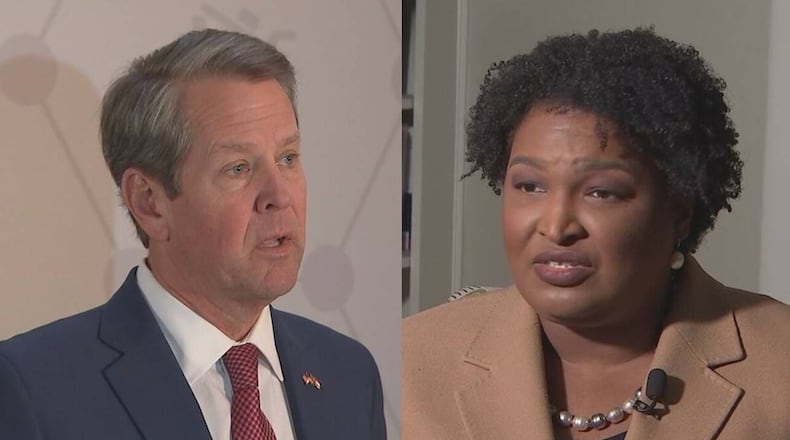The campaign of Democratic challenger Stacey Abrams asked a federal judge Wednesday to temporarily stop Gov. Brian Kemp from using a state law created to give him a major fundraising advantage in his reelection bid.
In court filings, Abrams’ campaign said it wants Kemp to be banned from using his leadership committee — which allows him to ignore contribution limits and raise unlimited amounts from individual donors — until after the May 24 primary. Then, Abrams, who is running unopposed in the Democratic primary, will be eligible by law to use the same kind of committee.
U.S. District Judge Mark Cohen ruled last week that Abrams won’t be the Democratic nominee for governor until her uncontested primary is held. Being the party’s nominee is a requirement for using the leadership committee law that the Republican-controlled General Assembly approved last year.
The law lets the governor, the opposing party’s gubernatorial nominee and party caucuses raise as much cash as they can throughout the campaign, including during legislative sessions. It gave incumbents an added edge since their challengers can’t use the funds until they win their party’s nomination.
Kemp’s leadership committee — Georgians First — was formed days after the law went into effect. Abrams has created a committee called One Georgia, which Cohen ruled can’t raise or spend money until after the primary.
“The statute unfairly allows defendant Georgians First to raise unlimited contributions on behalf of Governor Kemp based solely on his status as governor, and prior to his becoming the Republican Party nominee for governor of Georgia, whereas One Georgia is not currently permitted to do the same,” Joyce Gist Lewis, a lawyer for the Abrams campaign, wrote in its amended filing Wednesday.
In its initial lawsuit filed last month, Abrams’ campaign argued that she should be treated as the Democratic nominee now since she didn’t draw a primary opponent. U.S. Rep. Nikema Williams, the chairwoman of the state Democratic Party, filed an affidavit declaring Abrams the nominee.
Cohen rejected that argument. He also said Abrams’ campaign may have erred by initially asking to be allowed to use a leadership committee instead of questioning whether Kemp, under the law passed last year, should have an advantage no other candidate possesses.
The leadership committee law gives Kemp a potentially massive fundraising edge. There are limits on how much a candidate can raise from an individual or business interest. There are none for leadership committees, so they can collect huge checks from donors. The committees also can coordinate with candidate reelection campaigns.
As of Jan. 31, Kemp’s leadership committee had taken in at least $2.3 million since it was formed in June. That is on top of the $12 million the governor has reported having in his campaign account.
In the opening months of the campaign, Abrams and former U.S. Sen. David Perdue, who is challenging Kemp in the Republican primary, struck an alliance criticizing the leadership committee system. Both have framed it as an unfair law designed to help Kemp.
Perdue challenged it in court.
Cohen ruled in Perdue’s favor, issuing a decision in February that said the fund can’t be used to help the governor win his primary. However, the judge’s ruling held that Kemp’s fund can continue to receive unlimited donations to use in the general election campaign as long as the money isn’t spent directly on the governor’s primary campaign.
If Kemp wins his GOP primary, he faces a rematch with Abrams. The Republican narrowly won a closely fought contest with her in 2018.
About the Author
Keep Reading
The Latest
Featured



